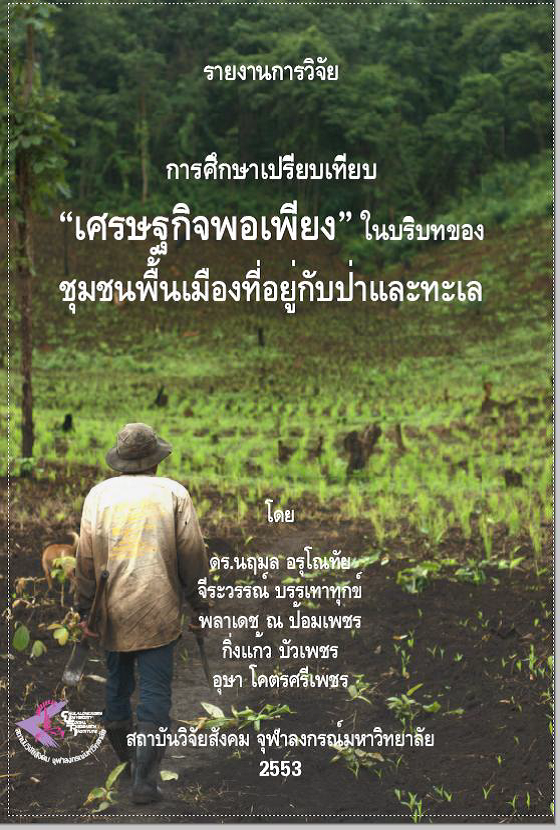
งานศึกษาวิจัยทางด้านมานุษยวิทยามีข้อค้นพบว่ากลุ่มชาติพันธุ์กะเหรี่ยงและชาวมอแกน(เคย)มีวิถีชีวิตขนบธรรมเนียมประเพณีที่นิยามได้ว่าเป็นเศรษฐกิจพอเพียง เอื้อต่อการจัดการทรัพยากรธรรมชาติและดูแลรักษาป่า ไร่หมุนเวียนไม่ใช่การตัดไม้ทำลายป่า แต่เป็นการทำเกษตรกรรมรูปแบบหนึ่งที่อาศัยองค์ความรู้พื้นบ้าน เน้นเพื่อการยังชีพเป็นหลัก การตัดฟันและเผาป่าที่ปล่อยทิ้งไว้เพื่อมาทำเป็นไร่ทำให้ผิวดินดารงความอุดมสมบูรณ์โดยไม่ต้องเติมสารเคมี ส่วนวิถีชีวิตของชาวมอแกนซึ่งอยู่กันเป็นกลุ่มเล็กๆ เดินทางโยกย้ายบ่อยครั้ง ก็เป็นวิถีแห่งการอนุรักษ์ เน้นความพอเพียงและการแบ่งปัน วิถีชีวิตแบบยังชีพกึ่งเร่ร่อนของชาวมอแกนเป็นเศรษฐกิจพอเพียงและเป็นระบบแบบหาแล้วใช้ทันที ไม่มีการสะสม วิธีการเก็บล่าทรัพยากรชายฝั่งนั้นต้องอาศัยความรู้พื้นบ้านทางทะเล การเดินเรือ การว่ายน้ำ ดำน้ำลึก แหล่งที่อยู่อาศัยและลักษณะนิสัยของสัตว์ทะเลชนิดต่างๆ ส่วนวัตถุดิบสำหรับการสร้างเรือ สร้างบ้าน ทำเครื่องมือเครื่องใช้ ยารักษาโรค ถ่านหุงต้ม และพืชผักผลไม้ที่นำมากินนั้นก็ได้จากป่าตามเกาะและชายฝั่งทะเล
แต่ด้วยสภาวะการก้าวเข้าสู่สังคมเปลี่ยนผ่านจากปัจจัยเร่งทั้งภายในและนอกชุมชน อันได้แก่กระแสการพัฒนาแบบทุนนิยม ระบบสังคมบริโภควัตถุนิยม ระบบการศึกษาที่เน้นการป้อนตลาดแรงงาน ความไม่รู้เท่าทันสิ่งใหม่ๆ ที่รุมเร้าเข้ามา และการขาดวิสัยทัศน์เรื่องคุณค่าวัฒนธรรมดั้งเดิมปัจจัยเหล่านี้ได้รุมเร้าชุมชนพื้นเมืองที่มีวิถีชีวิตแบบพอเพียงให้ค่อยๆ ละทิ้งวิถีดั้งเดิม ทั้งหลายเหล่านี้ส่งผลให้ชุมชนชาวกะเหรี่ยงที่อยู่กับป่าเขาและชาวมอแกนที่อยู่กับทะเลและสิ่งแวดล้อมชายฝั่งถูกเบียดขับเป็นคนชายขอบและถูกบั่นทอนความมั่นคงในชีวิต จึงทำให้ความมั่นคงของสังคมโดยรวมต้องสั่นคลอนไปด้วย
งานวิจัยนี้เน้นที่การศึกษาด้านนิเวศวัฒนธรรมของกลุ่มชาติพันธุ์กะเหรี่ยงและมอแกน โดยใช้กรณีศึกษาชุมชนกะเหรี่ยงโปว์บ้านคลิตี้ล่าง จังหวัดกาญจนบุรี และชุมชนมอแกนหมู่เกาะสุรินทร์ จังหวัดพังงา การวิจัยใช้ทั้งเชิงปริมาณและคุณภาพ โดยอาศัยแบบสอบถามและการสัมภาษณ์เจาะลึก การวิเคราะห์เชิงนิเวศวัฒนธรรมสะท้อนให้เห็นว่าการขาดนโยบายระยะยาวที่ชัดเจนเกี่ยวกับการส่งเสริมการจัดการทรัพยากรป่าและทรัพยากรทางทะเลของกลุ่มเหล่านี้และการปล่อยให้ระบบตลาดและทุนการผลิตเชิงพาณิชย์รุกคืบเข้าในบริเวณโดยรอบชุมชนเป็นแรงกดดันที่ทำให้ชุมชนปรับเปลี่ยนจากเศรษฐกิจพอเพียง เป็นเศรษฐกิจพึ่งพาภายนอก ซึ่งหมายถึงการบุกเบิกทรัพยากรเพิ่มเติมหรือไม่ก็ถูกกลืนกลายเข้าสู่ระบบเศรษฐกิจกระแสหลัก โดยเป็นฐานล่างสุดของระบบผลิตในฐานะแรงงานรับจ้าง โครงสร้าง และความแน่นแฟ้นของชุมชนจึงถูกบั่นทอนลง ดังนั้น แนวทางที่จะส่งเสริมเศรษฐกิจพอเพียงคือการทวนกระแสการ “ปล่อยฟรี” ให้กับระบบตลาดและการคำนึงถึงรากเหง้าทางวัฒนธรรมที่มีฐานคิดแบบเศรษฐกิจพอเพียงเป็นทุนเดิม
Many anthropological researches found that several indigenous groups in Thailand like the Karen and the Moken (used to) have a way of life that can be described as “sufficiency economy”. The way of living in harmonious with the environment facilitates wise management of nature resources. In the case of the Karen, rotation farming does not mean destroying forest. It is a type of sustainable agriculture that relies on traditional knowledge and based on subsistence living. “Slashing” and “burning” leaves the soil rich with natural nutrients; so chemical fertilizer is not needed. The Moken live in small groups and move occasionally. This semi nomadic life is the way of conservation with the emphasis on simplicity and sharing. This immediate return subsistence, together with semi nomadic lifestyle, reinforces non-accumulation principle. Like the Karen, the Moken depend on indigenous knowledge for both sufficiency and efficiency.
Rapid transformation towards non-sufficiency economy is pushed by external and internal forces like the spread of market economy and consumerism, education system that produce for labor market, lack of social and cultural immunization, etc. At the same time, these forced gradually marginalize indigenous groups and threaten their community security. This will indirectly affect the larger society.
This research focused on two case studies – the Pwo Karen in Lower Klity Creek Village in Kanchanaburi and the Moken on Surin Islands in Phang-nga. Both qualitative and quantitative methods were used. The research team conducted questionnaire interviews of all residential households in the communities. In-depth interviews were also carried out. The analysis of cultural ecology clearly reflects that “laissez faire” attitudes on commercialism, marketism, and consumerism put a great pressure on the communities and facilitates the transformation from sufficiency economy to dependency economy. This entails economic integration and more appropriation of common resources. On the other hand, more Karen and Moken travel out of their communities to earn their wage living. Tightly knitted communities are now threatened by these forces. It is necessary to review the national development policy and to put an emphasis on cultural policy in order revive and maintain the strength of sufficiency economy in the indigenous communities.
นฤมล อรุโณทัย, จีระวรรณ์ บรรเทาทุกข์, พลาเดช ณ ป้อมเพชร, กิ่งแก้ว บัวเพชร และอุษา โคตรศรีเพชร. 2553. รายงานการวิจัย การศึกษาเปรียบเทียบ “เศรษฐกิจพอเพียง”ในบริบทของชุมชนพื้นเมืองที่อยู่กับป่าและทะเล. กรุงเทพฯ: สถาบันวิจัยสังคม จุฬาลงกรณ์มหาวิทยาลัย.
The Andaman Pilot Project Team. 2010. A comparative study of “Sufficiency economy” in the contex t of indigenous sea and forest communities. Bangkok: Chulalongkorn University Social Research Institute.